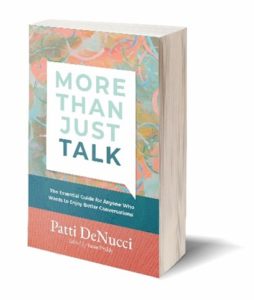Some people insist on enjoying the journey as much as the destination. I’m one of those people. (Maybe you can relate?) So, in working on my new book on conversation and connection (ironically, during a pandemic, when most opportunities for in-person conversations have been hampered), I’ve been focusing on the joy of the process. This includes the research, writing, and overall development of a book that I plan to make available to you soon .
.
I admit, the gestation on this project seems to be taking forever, but good things take time. In the meantime, I wanted to share with you just a few of the interesting insights I’ve learned on how to enjoy more meaningful exchanges and more pleasant socializing experiences, whether with total strangers, acquaintances, colleagues, customers, friends, or loved ones. Hope you find them interesting and useful. They are a mere sampling of what’s to come!
On why I’m writing this book in the first place: Several reasons. As a society, we’re either reluctant to engage or doing an awful lot of talking (in person and on line). For sure we’re not doing enough listening. In addition, we are spending too much time alone or tuning out by tuning in to our smart devices. Texting has replaced talking. The art of being graciously sociable and having meaningful, respectful, balanced exchanges is being lost.
On the benefits of conversation: In my research, I’ve discovered so many ways we can benefit from being pleasantly and selflessly social. Reading and writing about them about made my head blow up. Here are two: In work settings, if you are a skilled conversationalist on many topics (yes, beyond football, your cat, or the TPS reports you’re working on), you have a better chance of being considered a high-value member of the team. As such, you have a greater chance of keeping your job during a layoff. (Action item: broaden your repertoire of conversation topics. Read a book. Take an online course. Try a new hobby. Expand your horizons. Talk to people beyond your own department.) Also, if you want to stay happy and healthy and live longer while also skirting dementia, call (or spend time with) your friends once in awhile. Important: laugh and talk about positive things.
On mindset and intentionality: If you want to have more interesting conversations and fewer not-so-good ones (which can fall into a number of categories) the ball is in your court. Whatever you go in search of, you will likely find. So the next time you attend a wedding, a conference, a networking meeting, or any other event (hopefully, we will be able to do this again soon) and you say everyone was unsociable or boring, that’s actually…on you. It is possible to have good conversations just about anywhere, with just about anyone. You just have to want to – and learn how to do it.
On getting conversations started: Pretty simple. Be the one who offers a friendly “hello.” And ask a simple question such as, “How’s your day going?” Be proactive, caring, and curious.
On getting conversations going in an interesting direction: It’s all about the questions you choose to ask. And then listening, not just to the answers, but for clues on what to ask next. Get creative, but not weird or too personal. Ask what people are reading, what they’re watching on Netflix or Amazon or regular TV, who they’d invite to their Dream Dinner Party (and why), who their favorite teacher was (and why), where they would spend 30 days or what they would be doing if money, vacation time, and finding a babysitter were no object. So many interesting questions we could ask! As my friend Mike O’Krent says, you have the power to turn conversations into treasure hunts. The fun is in the exploration. Where do you want to go?
On becoming the friendliest, most fascinating, memorable, and likable person in the room: I sound like a broken record here… Be interested in others. Care about what they have to say. Ask questions. Listen more than you talk. One of the basic rules: you talk 40% of the time (or less); they talk 60% of the time (or more). Trivia tidbit: only about 5% of us are truly good listeners. However, most of us think we’re great at it. Ouch. That’s the Dunning-Kruger effect at work.
On conversation pet peeves: There are dozens of them. Again, another head exploder. Here are a few: not listening, being distracted, interrupting, one-upping, dominating the conversation, complaining / negativity, going into “gotcha mode” (where you have to adamantly prove they are wrong and you are right), being a know-it-all, gossip, being “the turd in the punchbowl” (ruining a lovely conversation by saying something negative, offensive, or grossly off-topic), and inauthenticity.
On settings and situations: The environment or setting can enhance or detract from good conversations. For example, if you’re hosting a party (I know, just try to imagine that one day this will happen), don’t think that by cranking up the music you are making the party better. You’re not. You’re just making it hard to visit, and now everyone has to yell to hear each other. (Maybe you want folks to get up and dance – different story.) Also, there are situations where people just don’t want to talk: on the Tube in London during commuting hours, for example. It’s just a thing. Or when they are trying to concentrate. Want a quiet, relaxing visit? Choose, set up, or move to a place that matches the mood.
On finding your tribe versus seeking our diversity: Feeling shy or awkward? Don’t know a soul at the party or event? Seek out people who seem to be like you. It will help you “warm up.” Ask basic questions such as, “How do you know the host / organizer?” or “What brought you here?” Dive into where they are from, where they work, what keeps them busy when they aren’t at work or in awkward social settings. Then move on to find conversation partners who aren’t just like you. This is where the good stuff can happen. Learn their stories, backgrounds, interests, how they approach projects, what their favorite hobbies were as a kid. Again, make it a treasure hunt. We all need “our people,” but we also can benefit from delicious variety.
On managing, shifting, and exiting conversations that aren’t going well. If the conversation topic is boring, negative, unpleasant, or unbalanced, you are free to ask if the topic can be changed. (“Do you mind if we change the subject / talk about something else / switch it up?”) Or you can simply excuse yourself. My friend Jan Goss-Gibson’s words are magical: “Please forgive me…” Then, if you feel compelled, add in an excuse for your exit. Refreshing your drink, using the restroom, checking in on your friend (real or imagined) – make something up. “But, isn’t this rude?” you may be asking. Nope. Not at all. It’s protecting yourself, which you have every right to do. You are setting boundaries and honoring your desire to spend more time in good conversations, less time in those that are going nowhere or draining your social batteries.
Well, I think that gives you a taste of what has kept me busy. If my calculations are right, I’ve written more than 100,000 words so far. Lots of revisions and ruthless editing up ahead for me. And LOTS of usable strategies and ideas for you. It’s gonna be great when this thing sees daylight.
Now it’s your turn: What are your thoughts? Tell me what YOU are interested in learning about having better conversations. What are some of your tips and strategies – or thoughts – that I can try to weave in? Maybe…give me a call. 512-970-8129 is my direct line. Leave me a message if I don’t pick up. I’ll call back. Promise. I’m eager for a great conversation! How about you?
Need a good read during this pandemic that will serve you well down the line – or sooner? Check out my first book The Intentional Networker: Attracting Powerful Relationships, Referrals & Results in Business.



These are great tips and suggestions Patti!
I’m on my way to a dinner party and was just wondering how to spice up conversation topics. Perfect timing!!!
Thanks, Teri! Hope the tips were helpful. Another fun question I found recently is this: What actors would you select to play your parents if there was a movie about them? I’ve been noodling on this all morning!